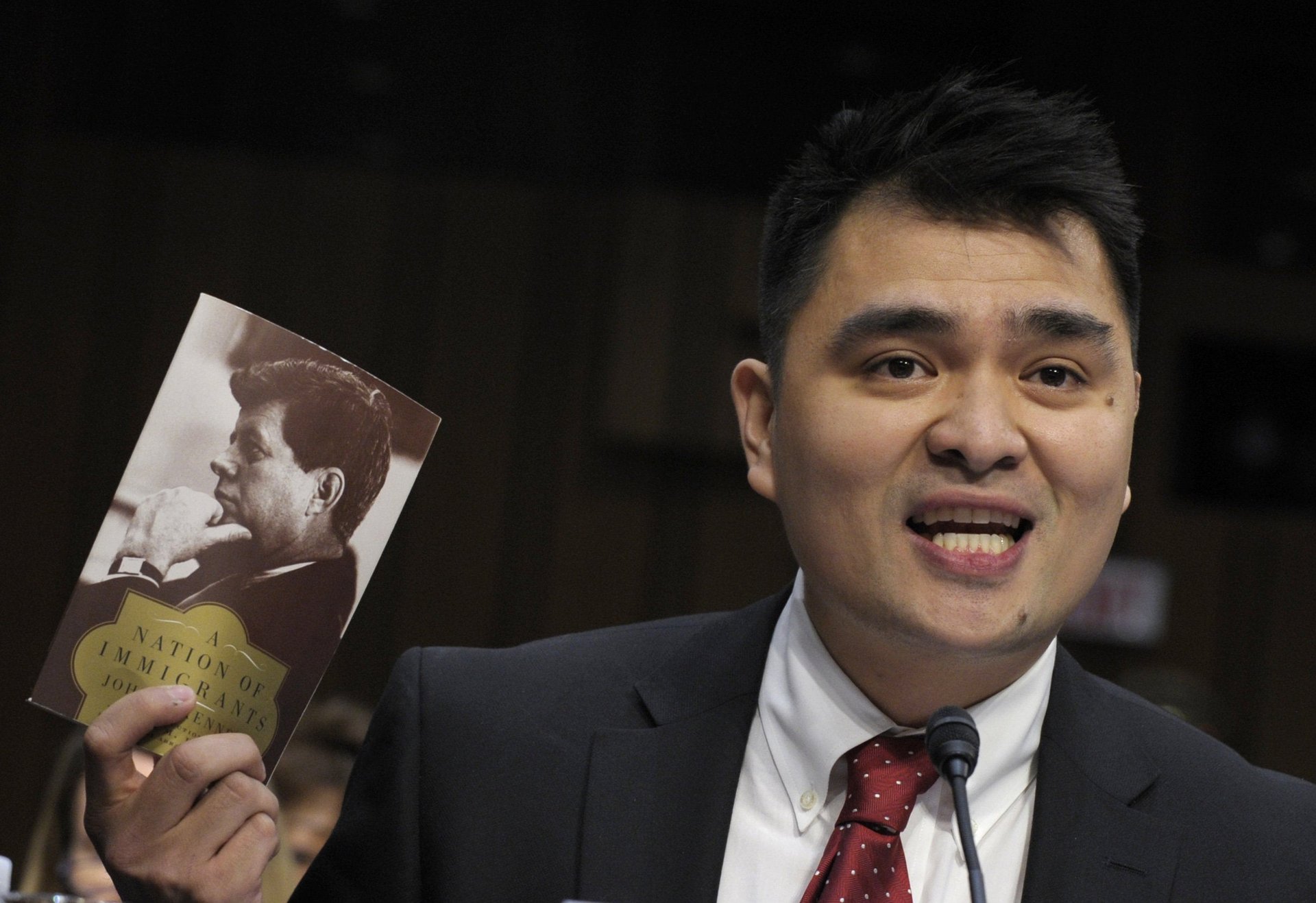Only love, marriage, and Congress can save America’s most famous undocumented immigrant
Surely there’s some way Jose Antonio Vargas could legally remain in the United States.


Surely there’s some way Jose Antonio Vargas could legally remain in the United States.
He’s been here 20 years.
He has a bachelor’s degree from San Francisco State University.
He’s won a Pulitzer Prize.
His grandparents are naturalized citizens.
He pays his income taxes (albeit using a fake Social Security number).
And yet…
The arrest of the journalist-turned-immigration activist in Texas last week puts a face on the plight of undocumented immigrants who came to the United States as children. Vargas, the founder of Define America, an immigrant rights advocacy group, wrote about his experience in a New York Times magazine piece and also chronicles it in a recently aired documentary film, Documented. The publicity is part of an effort to provide a path to lawful status for undocumented immigrants of good moral character who graduate from US high schools, under the so-called DREAM Act (Development, Relief, and Education for Alien Minors).
First, the bad news
The options for Vargas, like many undocumented adults, are unsurprisingly limited. For instance, despite having arrived in the United States when he was 12 years old, Vargas is ineligible for DACA (Deferred Action for Childhood Arrivals), the Obama administration’s response to Congress’ failure to pass the DREAM Act. DACA permits children who entered without documentation or overstayed their visa after a legal entry to live and work in the United States on a temporary basis. DACA provides no pathway to permanent residence or US citizenship. The problem for Vargas though is that he had already turned 30 about four months before the Obama administration announced DACA for those who were 30 years or younger. Vargas was thus ineligible.
Relief based on his sexual orientation (Vargas is gay) is also unlikely to yield many results. Having not applied for asylum during the allowable time period, that option is also off the table. Protection under the United Nation’s Convention Against Torture or a request to withhold his removal, which provide no avenue to reside permanently in the United States, are also unlikely to be available. His native Philippines, despite precluding same-sex couples to marry, has an international reputation for LGBT tolerance, which would make it difficult for Vargas to show a probability of persecution based on his sexual orientation.
Now, the good
If Vargas were to marry a US citizen, he could seek a green card based on that marriage. Vargas would need to show clearly that he was in a long-term relationship with a US citizen that predated his arrest last week. The marriage must be entered into in good faith, and the evidence presented would need to be robust, as US officials are extremely skeptical of marriages that occur after deportation proceedings have begun. If this option were pursued, Vargas could request a waiver for using a fraudulent passport to enter the United States and also argue that the actions of his parents when he was 12 should not be imputed to him.
Also, if Vargas were to marry a US citizen, he could apply for relief from removal based on his 20+ year residence in the United States and the hardship his removal would cause to his husband. Currently, he does not have one of the qualifying relationships with a US citizen parent, spouse, or child to request cancellation of removal. His grandparents are US citizens, but that is not a qualifying relationship. In any event, the standard for cancellation of removal—exceptional and extremely unusual hardship—is not easily met, especially where the relationship is a relatively new one.
Finally, Vargas may benefit from US congressional enactment of a private bill providing permanent resident status or citizenship in the United States. Dozens of such bills are introduced during each session, but only a handful are ever enacted. Yet Vargas’s story and extraordinary background is quite compelling. Perhaps US senators Mark Warner and Tim Kaine would introduce such a bill for a well-educated, Pulitzer Prize winner (won during the Washington Post’s coverage of the Virginia Tech shooting). And the immigration community should welcome one of its most vocal advocates’ receipt of citizenship. The bigger question, however, is whether Vargas—an immigrant advocate himself—would pursue such an option knowing that millions of other undocumented individuals or DACA recipients could not benefit from a similar pathway to a permanent status in the United States.
Vargas’s case and its complexities vividly depict why we can’t let another year pass without addressing the realities of our undocumented population. Whatever our political leanings, as a country we have to take ownership of a tragic human problem that we have allowed to occur, year after year, decade after decade.
We welcome your comments at [email protected].